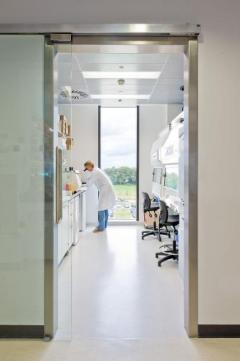Lessons from the latest coronavirus
The global effort to tackle Covid-19 has underscored the strength of collaboration and a broad research base.

The ongoing coronavirus pandemic has been the most devastating infectious disease for a generation, reaching almost every corner of the globe, causing widespread deaths and severe illness.
For the scientific community, emergence of the first cases from China in late 2019 and early 2020 prompted a robust response to a serious challenge.
Covid-19, the human disease caused by the SARS-CoV-2 coronavirus, is set apart from other serious zoonotic diseases transmitted from animals to humans by its long incubation period, which enables spread by people without symptoms, and its wildly differing clinical signs, which make the disease difficult to spot.
In the early days of the pandemic, witnessing the emerging situation “was like watching a slow-motion zombie apocalypse”, says Professor Paul Digard, chair of Virology at the Roslin Institute.
In the weeks and months that followed, scientists focused their endeavours towards the virus, as the pandemic spread and the response effort intensified.
Sharing information among scientists around the world has benefited these efforts.
Dr Elly Gaunt, a Research Fellow at the Roslin Institute, says despite accusations that China was not forthcoming about the virus in its early days, a wealth of information has since been shared.
“We know where the virus came from and when it emerged, and other important details – there has been an evolution of understanding based on the best scientific knowledge at each stage, and we’ve been kept up to date with that throughout.”
The value of previous work on coronaviruses, and expertise within the science community, was apparent from the outset.
This has included research carried out a decade ago by Dr Gaunt into the four varieties of human coronaviruses that cause common colds, which has been heavily cited by scientists in recent studies on SARS-CoV-2.
A wealth of work by researchers at the Roslin Institute, the wider University and beyond is seeking to better understand the virus and its origins, and inform ways to control it.
Roslin teams worked quickly to suspend ongoing projects and repurpose high-level containment labs suitable for work with live coronavirus, orienting the efforts of scientists and services teams to support the endeavour.
Willingness among researchers to play a part remains high, months on from the start of the outbreak. “The science community has come together very well, with a lot of people keen to work together, a lot of resources shared readily, and some great outcomes,” said Professor Digard.
It has been a back-breaking effort, but I am proud to be part of the response and I’m very happy with the way the University has responded, especially at Roslin.
Dr Gaunt adds: “There has been a very positive, collaborative drive to beat the pandemic. As a virologist, I needed to get on board. Some may feel a moral obligation to work on this problem, and that puts pressure on us. It’s a difficult balance to strike.”
Breadth of expertise in research and ease of collaboration are key to tackling emerging zoonoses effectively, according to Professor Digard. “A broad science base is essential to being able to respond flexibly as situations change. We were also fortunate at Roslin to have a team of core scientists, whose time could be put towards these urgent projects.”
The pandemic has also highlighted likely benefits of industry preparing to produce large-scale quantities of vaccines or drug treatments as required, the Professor adds.
Urgent changes to live animal markets, which are a source of zoonotic disease, would be a welcome move. “To have different wild animals in proximity with domestic animals in a closed environment is not helpful in limiting the risk of pandemics,” he adds.
With regard to vaccine development, Dr Gaunt is hopeful that it may be possible to develop a single-dose vaccine that would offer lifetime protection, which would avoid the need to design a new vaccine each season. “The genetic diversity of coronaviruses is nothing like that in flu – so lifelong protection may be possible,” she said.
At the time of writing, more than 100 vaccines against Covid-19 are in development, and nine candidate vaccines are undergoing phase three trials in large-scale testing on human volunteers – the final hurdle to approval for market.
For now, the search for a vaccine, reliable tests, and effective drugs against Covid-19 remain the focus of researchers around the world and society’s best hope for recovery.


